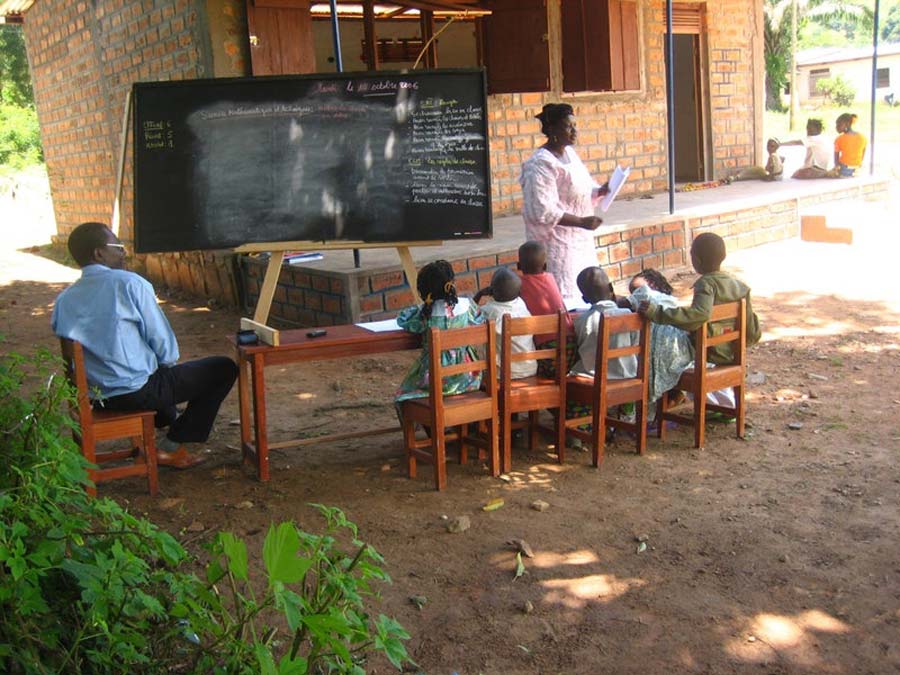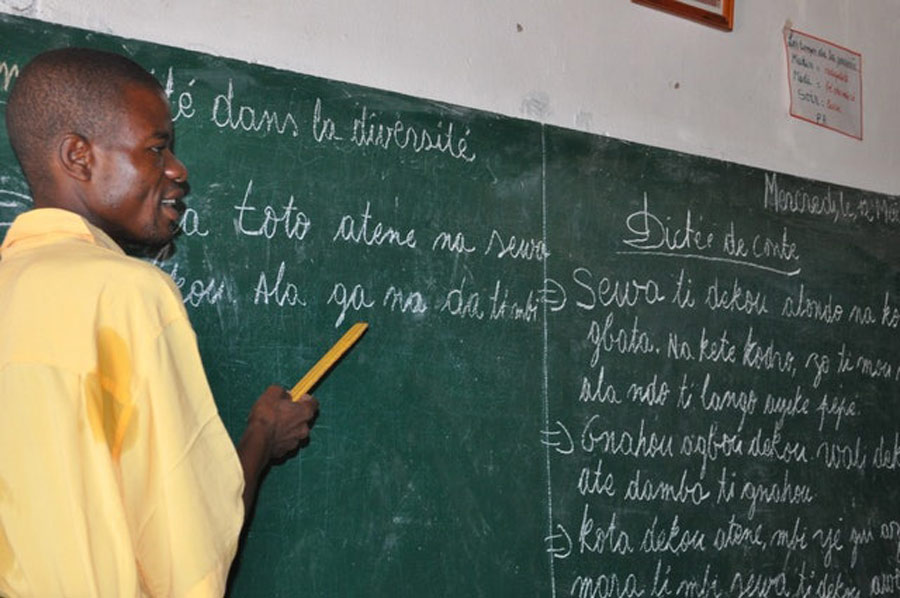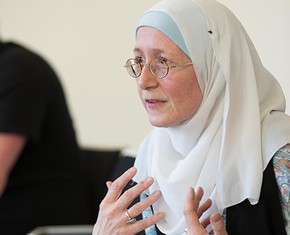In the Central African Republic a Baha’i-inspired organization is learning about fostering the emergence of schools from the grassroots, sustained by the local communities themselves.
The Ahdieh Foundation focuses on efforts to promote community schools, providing teacher training and other support to these community initiatives.
The foundation’s experience sheds light on the capacity and initiative of the people of the Central African Republic, which stands in contrast to the political instability and sectarian violence that are major features of the country’s global image.
“Ahdieh Foundation is part of a network of Baha’i-inspired organizations in Africa that are striving to see how to promote education at the grassroots and how to build capacity in communities to take charge of the education of the younger generation,” explains Nakhjavan Tanyi, the Continental Programme Coordinator for this network.
Like other Baha’i-inspired organizations, Ahdieh Foundation views its work as a process of learning about applying the Baha’i teachings and knowledge accumulated in various fields of human endeavour for the progress of society.
“The work of many Baha’i-inspired organizations focuses a lot on the community level. The long-term vision is how to help a community address all dimensions of its development. Usually it starts with one small effort or one particular dimension, in this case education,” says Mr. Tanyi.
Since its establishment in 2003, Ahdieh Foundation is gaining insights about the role of the teacher, the parents, and the school in a community. These insights, along with principles drawn from the Baha’i writings, shape the way teacher training is approached, how teachers are accompanied, and the functioning of each school in relation to the community:
Bend your minds and wills to the education of the peoples and kindreds of the earth, that haply the dissensions that divide it may, through the power of the Most Great Name, be blotted out from its face, and all mankind become the upholders of one Order, and the inhabitants of one City …. – Baha’u’llah, Gleanings from the Writings of Baha’u’llah, pp. 333-334.
“Many communities used to think that only teachers have knowledge to educate the children and that as a parent, you bring your child to school, leave the teachers to impart their knowledge and do not get involved,” says Mr. Judicaël Mokole, one of the staff at Ahdieh Foundation.
“Community schools are changing this idea,” he continues. “Parents and community members start seeing the school as an entity through which they can think and reflect and contribute to the education of their children.”
The approach taken by Ahdieh Foundation to starting schools seems to be central to fostering this sense of ownership.

Mr. Clément Feizouré (left), Director of Ahdieh Foundation, visits a class at a community school in Bangui.
“The organization will start a conversation with communities about what they themselves can do to be able to educate their own children,” Mr. Tanyi says. “Where members of a community, and its leaders, show a willingness to participate in that effort, then the idea is introduced of them being able to start a school that would grow organically over time that would start with a preschool. Then, depending not only on the availability of human resources in that community, but also the willingness of the community to continue, that school can grow and add a grade each year.”
“It’s best to start with the simplest thing and then build capacity over time for more complex things,” Mr. Tanyi explains.
The teachers, Mr. Tanyi says, are identified by the community itself.
“The idea is not to get someone from outside. It’s to get someone from within the community, who knows the community, who is familiar with its people, who knows its reality,” Mr. Tanyi explains. “What we see in this individual who arises to start teaching is not just a teacher whose work is limited to a classroom, but someone who can become an agent of change in a community.”
Drawing on the latent capacity of a community allows the schools to operate in a region that has experienced ongoing civil conflict since 2012.
“These community schools were the only schools that continued functioning in many parts of the country during the civil unrest,” states Mr. Mokole. “This was partly because the teachers of the community schools were local to the area. The community they served in was their home. They had nowhere to run to when the rebels came.”
“The content of the teacher’s training also helps them conceive of their work as service. It’s not merely a job they are doing to get money. They are teachers because they are motivated by a desire to prepare the younger generation for the future,” he continues.
The teachers also receive a small stipend, funded by parents and community members, for school supplies and personal expenses, Mr. Mokole explains. “And it will always be like this. Our experience has been that if you come with a salary sourced externally and pay the teacher in this way, from the top down, in the community there is something that is lost, that does not feel right, and the community school slowly crumbles,” he adds.
Similarly, Mr. Mokole says that when the initiative and resources come primarily from outside, or when the focus is on just providing a school building, communities do not have a sense of responsibility and investment in the school.
“It’s not uncommon to see schools built by outside organizations being used to house sheep and goats, or where people are using the desks and chairs in these buildings for cooking. From this you can see the value of the process starting from within the community, by the villagers themselves,” states Mr. Mokole.
The community members show such love for the simple structures they have built for their schools with their own hands, using materials such as straw, mud or wood, Mr. Mokole adds.
From time to time, as schools grow, there may be needs for which the resources available to the community are not sufficient, Mr. Tanyi says. “There will sometimes be needs for funds to come from outside. But we try to think very carefully about at what point we do that. We try to wait until the point when the community has really taken ownership of the project,” he notes.
“By no means are we saying that this is the solution to education at the grassroots,” clarifies Mr. Tanyi, “but we are very hopeful that this approach could help us really think about how to raise people in the community that can be protagonists of change and can spearhead development processes in their community.”
At present, 150 people who have participated in Ahdieh Foundation’s training program are providing education to nearly 4,000 students in 40 community schools, 10 of which offer the complete primary cycle, from kindergarten to grade six.

















Comments
Sign in or create an account
Continue with Googleor